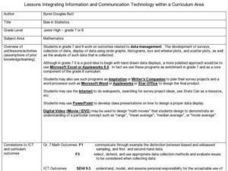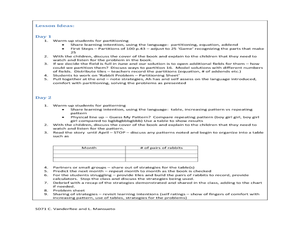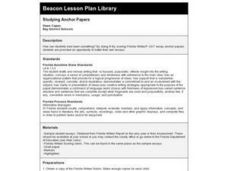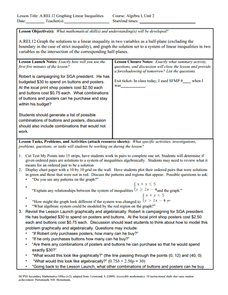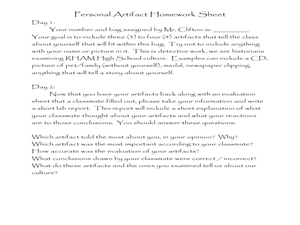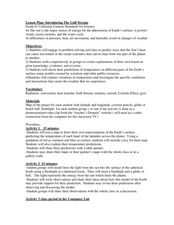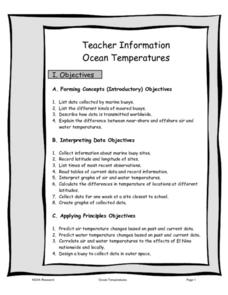Curated OER
Cave Paintings
Students examine various types of prehistoric art. In groups, they research the purpose of the drawings and use the internet to research the various ancient human groups. To end the lesson, they draw animals compared to the prehistoric...
Curated OER
Teams-Games-Tournaments
Young scholars draw cards from a pile and the student that draws the number card gets the first opportunity to answer the question. For example, if a student selects twenty-two from the pile and question twenty-two is, "why is government...
Curated OER
Graphing Linear Functions
Seventh graders identify the use of a function.They are asked to describe the input and output of a function. Students also identify different aspects of the coordinate system and represent functions in a visual graph.
Alabama Learning Exchange
Researching the Oceans of the Earth
Fifth graders participate in a research project involving the oceans of the earth. They research with the help of the library and the Internet. They put their collected research into a folder, brochure, PowerPoint presentation and a...
Curated OER
Shinto, Japan's First Religion
Learners participate in centers activities that enrich understanding of Japanese culture, history, geography, art, and religion.
Curated OER
Bias in Statistics
Students work to develop surveys and collect data. They display the data using circle graphs, histograms, box and whisker plots, and scatter plots. Students use multimedia tools to develop a visual presentation to display their data.
Curated OER
The Rabbit Problem
Students notice a number pattern in the book The Rabbit Problem by Emily Gravett. In this number pattern instructional activity, students represent and describe numbers appropriate to their grade level.
Curated OER
Studying Anchor Papers
Students examine the Florida Writes! Rubric and discuss the basic elements of the scoring system. In small groups, they use the rubric to discuss and score several student essays.
Curated OER
Graphing Linear Inequalities
Eighth graders extend skills for representing and solving linear equations to linear inequalities. Lesson activities build understanding and skill by plotting ordered pairs of numbers that either satisfy or do not satisfy a given...
Curated OER
"Adding It Up" at James Fort
Students discuss jettons and their archaeological importance at Jamestown. They then practice using historic counting sheets and artifacts to understand the calculating methods of the early 17th Century, and identify their similarities...
Curated OER
Smarty Pants
Students graph the colour distribution found in a packet of Skittle lollies, M&M's, Smarties or similar sweets. Results are compared and recorded against the results of other class members.
Curated OER
Integrated Social Studies and Math Lesson
Fourth graders study the American Civil War. They read and analyze information regarding the casualties of the Civil War, fucusing on Indiana soldiers. They graph the information and then write in their reflective journals responding...
Curated OER
Number Theory Worksheet 2: The Sieve of Eratosthenes
in this number theory worksheet, students use the Sieve of Eratosthenes to find all primes up to the number 100. Students follow the directions to circle primes and multiples on the hundred chart.
Curated OER
Number Theory Worksheet 2: The Sieve of Eratosthenes
In this primes and multiples worksheet, students follow the directions to circle primes and multiples on a hundred chart until all prime numbers from 1 to 100 are circled. This is called the Sieve of Eratosthenes.
Curated OER
Number Theory: The Sieve of Eratosthenes
In this number theory learning exercise, students read about The Sieve of Eratosthenes and follow a set of directions to complete a prime number activity and answer 4 related questions.
Curated OER
Personal Artifacts
Ninth graders put their observation skills to work. In this observation skills lesson, 9th graders examine personal artifacts that their instructor has gathered. Students take notes on the artifacts they analyze and write lab reports...
Curated OER
The Shadow Knows
Students pick different objects and measure the shadow they cast. In this geometry lesson, students experiment with shadows using a flashlight and an object to cast a shadow. They measure and differentiate between the shadow and the real...
Curated OER
The Twelve Days of Christmas
Fourth graders investigate the holidays by performing a song with their class. In this Christmas instructional activity, 4th graders recite some of their favorite Christmas songs and read the lyrics to the song "The Twelve Days of...
Curated OER
How to Avoid Having a Bad Day
Second graders explore cause and effect. They read Alexander and the Terrible, Horrible, No Good, Very Bad Day. They discuss their own experiences with bad days. Students identify the causes and effects in the book. They write a letter...
Curated OER
Introducing The Gulf Stream
Sixth graders research the average temperatures of different places on Earth. In this earth science lesson, 6th graders explain how the sun's heat cause ocean movement. They discuss how temperature change affects the weather we experience.
Curated OER
Ocean Temperatures
Students list data collected by marine buoys and the different kinds of moored buoys. They describe how data is transmitted worldwide. They explain the difference between near shore and offshore air and water temperatures.
Curated OER
Graphing
Fifth graders practice using math graphs. In this graphing instructional activity, 5th graders work in groups to develop a topic of their own to represent as a graph. Students collect data and construct a graph for the instructional...
Curated OER
Nand Gate Logic
Pupils assess how to construct all possible circuits out of Nand gates. They divide into groups and are given a set of manipulatives to organize and explain the operation of a Nand gate. Each group recognizes the need to construct...
Curated OER
Open-Ended Scientific Method Lab
Learners inspect a given problem and come up with a hypothesis. In this investigative lesson students come up with a hypothesis for a problem, test each hypothesis and evaluate how successful each one was.







